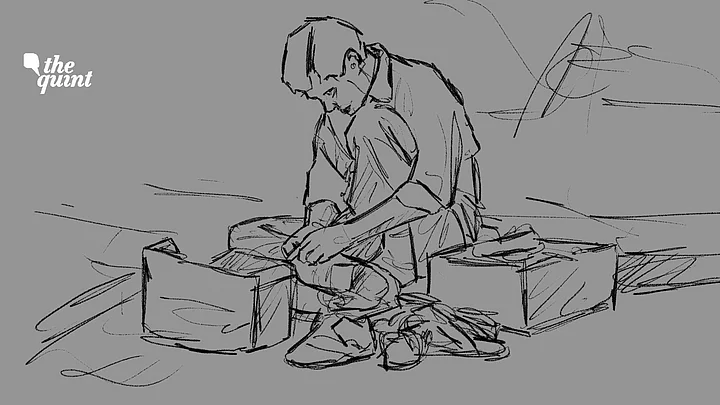This is the story of Ramesh, a 52-year-old shoemaker. A daily-wage labourer, he makes leather shoes in Uttar Pradesh's Agra.
Ramesh loses nearly half an hour every day, from his productive work hours, due to the high heat, and is unable to make as many shoes because the heat exhausts him.
India loses around 101 billion hours a year because of high heat, as per a recent study titled ‘Increased Labour Losses and Decreased Adaptation Potential in a Warmer World,’ by researchers at Duke University, North Carolina, USA.
This rise in heat takes away productive hours from labourers, and is said to be a cause of health-related problems, such as acute kidney damage, can lead to injuries at workplace, and even early death.
From 101 billion hours, the lost productive time will go up to 230 billion hours a year when the global temperature reaches 2 degree Celsius over pre-Industrial Revolution levels.
The global temperature is currently at 1.1 degree Celsius over pre-Industrial Revolution levels.
Let's do some math here: 230 billion hours means work done by 35 million people who work for eight hours every day, throughout the year.
“Many workers in the tropics are already stopping work in the afternoon because it's too hot,” experts say. As per the study, countries such as India, China, Pakistan and Indonesia, where larger fractions of the population work outdoors, will experience the biggest losses overall, the study projects.
Of the hours that are lost, nearly 30% can be recovered by moving labour to cooler hours of the day, as per the Duke University study.
Ramesh could work a lot more if he was making shoes during the night rather than during peak heat hours of the day.
This solution, however, will only work when early mornings or evenings are relatively cooler. On extreme heat days or during the heatwaves, even this will fail.
“This particular work shift adaptation potential is lost at a rate of about 2% per degree of global warming as early morning heat exposure rises to unsafe levels for continuous work, with worker productivity losses accelerating under higher warming levels,” says the study.
Loss of Productive Hours = Economic Loss
This loss of productivity in the number of hours directly translates into economic loss.
Ramesh loses 162 working hours every year, which is almost 20 days of work. When he fails to make 10 shoes to order in a day, he gets paid less. When we multiply this loss with millions of labourers across the globe, it amounts to $1.6 trillion every year, said the study.
These economic losses triggered by climate change push the already financially vulnerable people like Ramesh further into poverty.
Ramesh works indoors, and so things are a bit better for him in comparison to his two brothers – Suresh and Mahesh. Suresh is a farmer and Mahesh works as a daily wage labourer at a construction site.
Things are harder for them. The report says: “Critical jobs, such as agricultural work and construction work, will become almost impossible to perform safely during afternoon hours in the summer in many places.”
This change is not as gradual or slow as we might think. The last 10 years on earth have been the warmest in the last 1.2 lakh years.
Ramesh’s ancestors were able to work more and face a lot less of these extreme heat days. The next generation of shoemakers, however, will find it increasingly difficult to continue work for the same number of hours as him in the same room with no air-conditioning.
